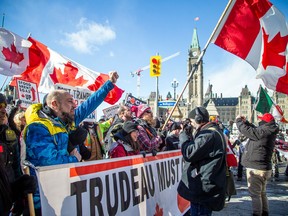The convoy-anniversary protesters got kid-glove treatment — again. But officers aren’t so lenient with other demonstrators.

Article content
After the controversy surrounding the convoy anniversary protest in Ottawa, Chief Eric Stubbs tried to squash the idea that Ottawa police have a double-standard when handling protests in the capital: one for convoy protesters and another for other groups. Stubbs will have to try harder because the evidence on the ground belies the claim of police neutrality.
Advertisement 2
Article content
The controversy stemmed from the second-anniversary convoy protest held in Ottawa Feb. 17, during which a group launched fireworks in a Centretown parking lot. Ottawa bylaw officials told reporters that officers at the fireworks did not issue any tickets for noise or other infractions because Ottawa police asked them not to do so for “an officer safety issue.”
Article content
That admission sparked accusations of favouritism, with some councillors, MPPs and civic groups accusing the police of a double standard, noting that officers treat convoy protesters relatively leniently, while acting much more harshly with other groups. They pointed to pro-Palestinian protesters and trans-rights groups, who were hit with $490 noise-violation tickets for the use of megaphones and microphones. But when convoy protesters came to town, critics allege, they got a different treatment.
Stubbs however, told CTV that accusations of a double-standard “couldn’t be further from the truth” and said bylaw officers were asked to not issue tickets for safety reasons — not because police are sympathetic to the convoy movement or take sides during protests. He said protesters at the fireworks were “highly agitated,” and in the interest of public safety, police asked bylaw officers to withdraw in order to diffuse a volatile situation.
Advertisement 3
Article content
Stubbs said police themselves actually issued tickets for a range of violations, including driving while suspended, operating a vehicle without insurance, parking infraction and excessive noise. He blamed the ensuing mixed messaging from the police and city bylaw on botched communication. The police, he stressed, are neutral during protests.
“Last week there were reports that we have a double standard or are sympathetic to the convoy movement. This is simply not true,” he told the police services board last week. “We remain a neutral agency.”
That’s hard for many to believe in light of everything we know about protests in the city, particularly the recent treatment of pro-Palestinian protesters, and other non-convoy groups in the past. During the Feb. 17 convoy protest, we saw people with megaphones, but what we didn’t see was the kind of aggressive public display of ticketing that happened with the pro-Palestinian groups.
What we often hear from police is that fear of violence during protests necessitates the use of de-escalation strategies. Which means any time convoy protesters threaten violence, police back off, further emboldening the protesters. Most people will agree that de-escalation tactics are a crucial part of good policing, but the question often is why these tactics are only used for some groups and not others.
Advertisement 4
Article content
In a 2020 Black Lives Matter protest over the acquittal of Const. Daniel Montsion in the death of Abdirahman Abdi, police forcefully removed protesters from a city intersection and charged 12 of them. No de-escalation. Last year, six people were arrested for mischief during a climate change protest that blocked Laurier Street. In other situations, such as the events leading to the death of Abdi, who was beaten, we didn’t see de-escalation either.
With all due respect to Stubbs, it is hard to believe that if any group other than convoy protesters were setting off illegal fireworks, bylaw would have been asked to withdraw to allow tempers to cool. In all likelihood police would have intervened forcefully and removed the protesters.
This is not the first time police have been accused of a double standard, and it may not be the last. We agree that police should to be fair and even-handed when dealing with protesters no matter their political views, but a large section of the community remains skeptical that police are neutral, and enforce the rules fairly. That is what’s troubling, and why Chief Stubbs has a lot more work to do.
Mohammed Adam is an Ottawa journalist and commentator. Reach him at nylamiles48@gmail.com
Recommended from Editorial
Article content





